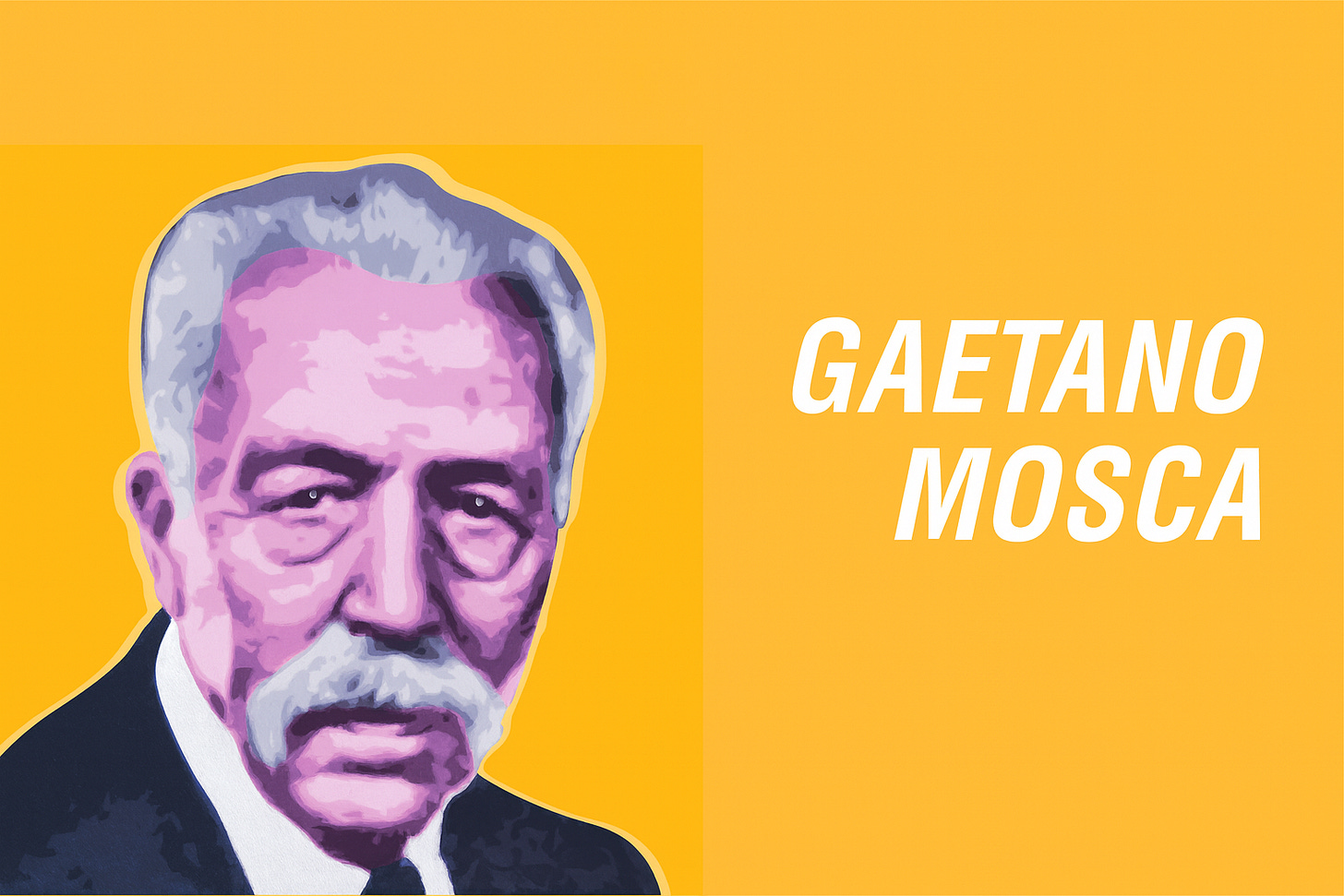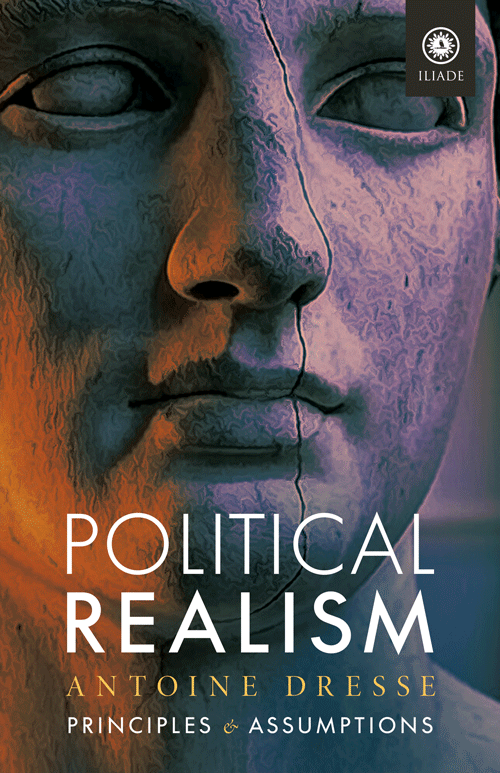Gaetano Mosca and the Elites
The Ruling Class: A User's Guide

Antoine Dresse (“Ego Non”) examines Gaetano Mosca's foundational theory that all societies are governed by organized minorities, not the masses or individual rulers. Mosca argued that real power lies in small groups' ability to organize, while majorities remain fragmented, regardless of whether a system calls itself a democracy, monarchy, or republic. This insight reveals the oligarchic reality beneath institutional facades.
If the National Education system did its job, it would put the classics of political thought on the high school curriculum alongside the great authors of literary heritage. Man would then become a political animal. Ego Non, who runs the YouTube channel of the same name, offers us more than a catch-up session - an introduction to the art of governing (oneself).
Three great figures compose what is called the Italian school of elite sociology: Vilfredo Pareto, Robert Michels and Gaetano Mosca. But while we know Pareto's famous principle of the "circulation of elites", as well as Michels' "iron law of oligarchy," few in the world can connect Mosca to any notion whatsoever. And yet, it is to Mosca that the merit belongs of having founded this neo-Machiavellian current of thought.
The central thesis that unites these authors indeed rests on an elitist and realist vision of political life. According to them, the structure of any society inevitably rests on a dichotomy between a ruling minority and a governed majority. Now, it is Gaetano Mosca who, in his Elementi di scienza politica (1896), first formalizes this observation through what he calls the theory of the political class: an elite always governs, whatever the institutional form of power. This elite draws its legitimacy and stability not from its ideology, but from its capacity to organize itself and reproduce itself.
REAL POWER
This "theory of the political class" germinated in Mosca's mind when he was still only a young student at the University of Palermo. Occupied as he was reading Hippolyte Taine's The Origins of Contemporary France, it occurred to the young man to generalize the method that Taine had used in his book.
The young Mosca’s first thought was that any society could be analyzed in the same way that Taine had analyzed monarchical France. If one carefully observes a country - whether it is designated as a monarchy, a tyranny, or a republic - one inevitably finds that real power is never exercised by a single person, the monarch or head of state, nor even by the entire community of citizens, but rather by a particular group of people, always quite restricted compared to the total population. Taine had also shown that the traits of the brilliant French civilization of the era of the Sun King were due less to the French people as a whole than to the French aristocracy, and seemed in fact linked to the particular conditions in which this aristocracy had evolved during the 17th and 18th centuries.
This principle, too, thought Mosca, could be generalized into a thesis according to which the dominant traits of a given society during a given period would fundamentally be the traits of the group of people who govern it (politicians, rulers, etc.).
The domination of a minority over the majority is a constant and natural fact. Mosca supports this by means of a fundamental sociological argument: the minority governs because it is organized, while the majority, by definition, is disorganized.
Mosca was obviously not the first to say that a society was governed by its elites. His originality, however, lies in the generalization of a seemingly banal historical fact into a universal sociopolitical law. Is this not, after all, the mark of great minds? One did not have to wait for Carl Schmitt, for example, to know that the political world was full of enemies. Every practitioner of politics knew this empirically. Yet, it was Schmitt who forcefully underscored the idea that there would be no politics without a relationship of hostility in the world. As Benedetto Croce very rightly noted, the originality of great thinkers lies not so much in their perceiving things that no one else has ever seen as in the importance they accord at times to one commonplace thing and at other times to another.
THE ORGANIZED MINORITY
Now, it is to the "elitist" phenomenon that Mosca devoted all his attention, and it is on this that he attempted to found a modern political science. The latter stands in direct opposition to Aristotelian political science and the attempt to classify political regimes according to legal or ideal categories, as if these distinctions reflected the reality of power in societies. According to Mosca, the ideal classification of "monarchy, aristocracy, or democracy” does not allow us to understand the real mechanisms of power.
These denominations, according to Mosca, describe only the apparent number of people involved in governance, but not the true structure of power. A monarchy is not necessarily governed by a single man, any more than a democracy means that all are effectively governing. Political scientists must henceforth avoid confusing the legal nature of a regime (its constitution, its laws, its written institutions) with the sociological nature of power (who really governs how and why). A regime can very well preserve a democratic facade while functioning as an oligarchy.
This is why one must go beyond institutional appearances to observe the real composition of the ruling class and its modes of recruitment.
Now, the oligarchic phenomenon is a fact structuring any political society, the domination of a minority over the majority is a constant and natural fact. Mosca supports this by means of a fundamental sociological argument: the minority governs because it is organized, while the majority, by definition, is disorganized. This principle is, according to him, inevitable. A united, coherent minority capable of collective action will always prevail over a dispersed majority whose members act in isolation. This is an application of a principle of social force: what makes political power is not only number, but coordination, discipline, and strategy.
Mosca develops this idea through a simple but effective analogy: a hundred men acting in perfect harmony will triumph without difficulty over a thousand individuals acting separately. Not only is unity their strength, but their small number makes them more apt to understand each other, to exchange, to make quick decisions. One must recognize in this a law of social dynamics: the smaller the group, the more effectively it can act. Similarly, the more numerous the governed population, the more the governing minority appears reduced in proportion and the more difficult it is for the majority to organize itself as a counter-power. In small communities, collective reactions are possible, even frequent. But in vast and complex societies, the fragmentation of interests, geographical distance, and differences in conditions make the unity of the governed practically impossible.
FEUDAL OR BUREAUCRATIC ORGANIZATION
Mosca therefore breaks with any normative political tradition. He does not seek to know who governs or whether the regime is legitimate according to some moral ideal whatsoever, but how power is really exercised in a given society. What interests him is not the number of rulers or the formal source of authority, but the social structure that makes the exercise of power possible. Hence, the Italian political scientist distinguished two particular modes of organization: the feudal system and the bureaucratic system, one based on personal bonds of loyalty and on a coherent and homogeneous social type, the other on an impersonal administrative centralization and a more fragmented society. These are two opposite ways of organizing domination.
This typology is therefore more than a descriptive tool: it reflects the very logic of the Moscaian project. Where the ancients saw ideal political forms, Mosca sees the organizational structures of power traversed by relations of force, the level of civilization, the degree of social complexity and the dominant type. And this is why, in his perspective, a monarchy can be feudal or bureaucratic, and so can a democracy. The name matters little; what counts is the way in which power is organized, legitimized and reproduced. Mosca thus abandons the constitutional surface to plunge into the real mechanics of power.
To go further: Only Gaetano Mosca's History of Political Doctrines since Antiquity has been translated into French. Unfortunately, this is far from being his most interesting book.
For those who do not speak Italian, his opus magnum, Elementi di Scienza Politica, has been translated into English by Arthur Livingston under the title The Ruling Class.
Originally published in Éléments no. 215, August-September 2025.
Translated by Alexander Raynor





Good stuff 👍
Est-ce qu’ Antoine va donner accès à son site web également avec un abonnement sur Substack maintenant qu’il est sur cette platforme?